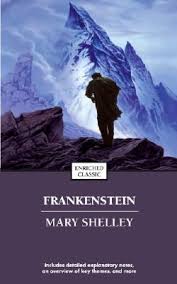The Frankenstein question has two forms:
Is it right for anyone, God or Man, to create human life?
Will scientists be destroyed by their own creations?
Some religious believers would jointly answer both, i.e., "Creation of life is a divine prerogative. Any scientists who usurp the divine role will rightly be destroyed by their own creation."
In Poul Anderson's The Stars Are Also Fire, humanly created artificial intelligences regard the continued existence of free human beings as a threat to their own destiny. In Anderson's Genesis, the existence of humanly created artificial intelligences has eventually caused the extinction of humanity but one AI has usurped the divine/Frankensteinian role of re-creating humanity! Thus, Anderson addresses both forms of the Frankenstein question.
Frankenstein, or The Modern Prometheus was the first science fiction novel. Anderson was a successor of Shelley not only because he wrote science fiction but also because he updated Frankenstein's questions. Shelley, of course, came long before Anderson's other main predecessors: Wells, Stapledon and Heinlein.

5 comments:
Kaor, Paul!
God, of course, being the Lord and Creator of the cosmos, has the right to create life. I don't know, however, if any Catholic theologians have discussed the issue of whether human beings can rightly create new life, esp. intelligent life. An interesting point!
And one persistent omission in your discussions of the precursors of science fiction is Jules Verne. I argue that the author of such classics of proto hard SF as TWENTY THOUSAND LEAGUES UNDER THE SEA and FROM THE EARTH TO THE MOON has as much right to be considered a main precursor of modern SF as Mary Shelley and H.G. Wells.
Sean
John Maddox Roberts wrote *The Strayed Sheep of Charun* (later expanded as *Cestus Dei*) about a future in which national governments had collapsed and theocracies took over -- rather improbably, Judaism was a "great power" right alongside Islam and (unified under Roman Catholicism) Christianity. The other two of the "big five" were Buddhism and Hinduism.
The relevance is that all faiths had in common an abhorrence of cloning-like techniques which could rapidly produce large numbers of workers ... or soldiers. They spoke of such as "the soulless," and the revelation that the colony world Charun used those processes was enough to make Muslim and Jewish representatives offer to support a Christian-led holy war against the Charun system. So in Roberts' fictional world, at least, the creation of intelligent life by humans was absolutely condemned.
Sean,
would you be able to write an article comparing Verne and Anderson?
Paul.
Hi, David!
First, your comments reminded me of Frank Herbert's DUNE, esp. an event set long before the events in that book, the Butlerian Jihad, a holy war waged to destroy and stamp out "thinking machines." Apparently conscious level, self aware computers.
I'm by NO means an expert on the ethics of cloning, but I think the common Catholic view is that some forms of cloning are morally licit. Such as, for example, taking cells from a kidney and using them to clone a new kidney. It is totally unethical to abort a baby and use cells from the remains for cloning.
And I'm somebody is now trying to clone a human being, not merely organs.
Sean
Kaor, Paul!
Oh dear, I have read three or four of Jules Verne's books, but I'm by no means an expert on his writings. I fear I simply don't know enough to be able to compare him with Poul Anderson. Except that some consider Verne to be directly ancestral to the "hard" branch of SF.
Sean
Post a Comment